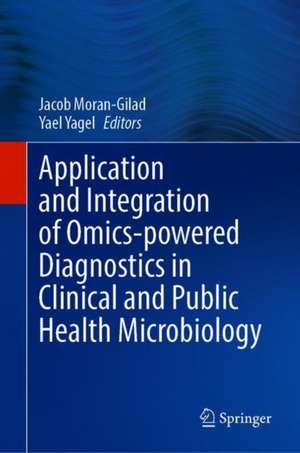Application and Integration of Omics-powered Diagnostics in Clinical and Public Health Microbiology
Editat de Jacob Moran-Gilad, Yael Yagelen Limba Engleză Hardback – 3 iun 2021
While there are numerous scientific publications on “omics” applications for microbiology, there are relatively few books that review this topic from a clinical diagnostics perspective. This book looks at this field from a holistic viewpoint, instead of limiting by type of “omics” technology, in order to cover the body of knowledge needed for practitioners and academics interested in clinical and public health microbiology. Additionally, it addresses the management, economical, regulatory and operational aspects of integrating these technologies into routine diagnostics.
| Toate formatele și edițiile | Preț | Express |
|---|---|---|
| Paperback (1) | 1028.62 lei 6-8 săpt. | |
| Springer International Publishing – 4 iun 2022 | 1028.62 lei 6-8 săpt. | |
| Hardback (1) | 1035.55 lei 6-8 săpt. | |
| Springer International Publishing – 3 iun 2021 | 1035.55 lei 6-8 săpt. |
Preț: 1035.55 lei
Preț vechi: 1090.06 lei
-5% Nou
Puncte Express: 1553
Preț estimativ în valută:
198.20€ • 204.26$ • 167.33£
198.20€ • 204.26$ • 167.33£
Carte tipărită la comandă
Livrare economică 01-15 martie
Preluare comenzi: 021 569.72.76
Specificații
ISBN-13: 9783030621544
ISBN-10: 3030621545
Ilustrații: VI, 240 p. 17 illus., 15 illus. in color.
Dimensiuni: 155 x 235 mm
Greutate: 0.53 kg
Ediția:1st ed. 2021
Editura: Springer International Publishing
Colecția Springer
Locul publicării:Cham, Switzerland
ISBN-10: 3030621545
Ilustrații: VI, 240 p. 17 illus., 15 illus. in color.
Dimensiuni: 155 x 235 mm
Greutate: 0.53 kg
Ediția:1st ed. 2021
Editura: Springer International Publishing
Colecția Springer
Locul publicării:Cham, Switzerland
Cuprins
Ch 1: Overview of Microbial NGS.- Ch 2: WGS for Bacterial Identification and Susceptibility Testing.- Ch 3: WGS for Bacterial Virulence Assessment.- Ch 4: Epidemiological Typing by WGS .- Ch 5: Bioinformatics Approaches for WGS Analysis.- Ch 6: WGS for Clinical Virology.- Ch 7: WGS for Clinical Mycology.- Ch 8: WGS for Clinical Parasitology .- Ch 9: Long Read Sequencing.- Ch 10: Aspects of WGS Integration.- Ch 11: Microbiome Analysis.- Ch 12: Metagenomics of Environmental Samples.- Ch 13: Clinical Metagenomics .- Ch 14: Metagenomics for Pathogen Discovery.- Ch 15: Advanced Applications for MALDI-TOF: Typing.- Ch 16: Advanced Applications for MALDI-TOF: Infectious Diseases and Antibiotic Susceptibility Testing (AST).- Ch 17: Omics for Food and Water Microbiology.- Ch 18: Omics for Forensic and Post-Mortem Microbiology.- Ch 19: Omics for Antimicrobial Resistance Surveillance.- Ch 20: Total Laboratory Automation.
Notă biografică
Dr. Jacob Moran-Gilad
Department of Health Systems Management, Faculty of Health Sciences
Ben-Gurion University
Israel
Dr. Yael Yagel
Department of Health Systems Management
Ben-Gurion University
Israel
Textul de pe ultima copertă
Various “omics” methods have recently revolutionized molecular diagnostics. Next-generation sequencing (NGS) makes it possible to sequence a human genome in just one day. Whole genome sequencing (WGS) greatly improves the ability to investigate the outbreaks of numerous pathogens. Metagenomics helps to analyze the microbiome, which aids greatly in identifying the pathogenesis of infectious diseases. Proteomic-based methods, namely matrix-assisted laser desorption-ionization time of flight mass spectrometry (MALDI-TOF-MS), have a promising role in identifying myctobacteria and fungi, and predicting antimicrobial resistance.
While there are numerous scientific publications on “omics” applications for microbiology, there are relatively few books that review this topic from a clinical diagnostics perspective. This book looks at this field from a holistic viewpoint, instead of limiting by type of “omics” technology, in order to cover the body of knowledge needed for practitioners and academics interested in clinical and public health microbiology. Additionally, it addresses the management, economical, regulatory and operational aspects of integrating these technologies into routine diagnostics.
Caracteristici
Discusses "omics" technology from a holistic, clinical point-of-view
Provides explanation of numerous types of omics technology
Cutting-edge resource edited by and featuring contributions from field-leading researchers and practitioners
Provides explanation of numerous types of omics technology
Cutting-edge resource edited by and featuring contributions from field-leading researchers and practitioners
